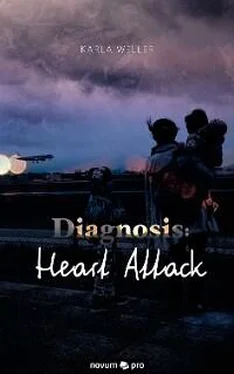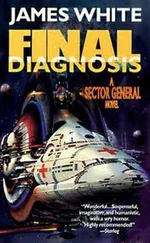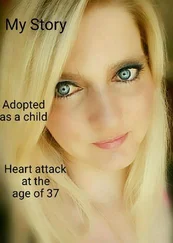Karla Weller - Diagnosis - Heart Attack
Здесь есть возможность читать онлайн «Karla Weller - Diagnosis - Heart Attack» — ознакомительный отрывок электронной книги совершенно бесплатно, а после прочтения отрывка купить полную версию. В некоторых случаях можно слушать аудио, скачать через торрент в формате fb2 и присутствует краткое содержание. Жанр: unrecognised, на английском языке. Описание произведения, (предисловие) а так же отзывы посетителей доступны на портале библиотеки ЛибКат.
- Название:Diagnosis: Heart Attack
- Автор:
- Жанр:
- Год:неизвестен
- ISBN:нет данных
- Рейтинг книги:4 / 5. Голосов: 1
-
Избранное:Добавить в избранное
- Отзывы:
-
Ваша оценка:
- 80
- 1
- 2
- 3
- 4
- 5
Diagnosis: Heart Attack: краткое содержание, описание и аннотация
Предлагаем к чтению аннотацию, описание, краткое содержание или предисловие (зависит от того, что написал сам автор книги «Diagnosis: Heart Attack»). Если вы не нашли необходимую информацию о книге — напишите в комментариях, мы постараемся отыскать её.
A severe heart attack throws the project manager Gerd completely off track. From one second to another, life changes dramatically for him and his whole family. Instead of travelling around the world as a successful business man, he is in need of assistance for everything now.
As a strong-willed person, he fights his way back – just to find out that he cannot accept his new life circumstances.
Diagnosis: Heart Attack — читать онлайн ознакомительный отрывок
Ниже представлен текст книги, разбитый по страницам. Система сохранения места последней прочитанной страницы, позволяет с удобством читать онлайн бесплатно книгу «Diagnosis: Heart Attack», без необходимости каждый раз заново искать на чём Вы остановились. Поставьте закладку, и сможете в любой момент перейти на страницу, на которой закончили чтение.
Интервал:
Закладка:
Because wandering up and down the hall might also be dangerous for Gerd, precautions had been taken. So one day, when I came to visit, I found him strapped to his wheelchair once again. He was not aware what kind of a vehicle he was sitting in and complained instead, “I want to get out of this car! Get me out here!” He was completely disoriented, “Where am I? What day is it?” He asked these questions incessantly without really being able to understand the responses. I often met him in the hallway, deeply saddened, his face covered in tears. He wanted to go on a trip, but couldn’t find his ticket, he explained.
These terrible hours of depression were followed by phases of complete overconfidence when he wanted to make a phone call, for example, even though he couldn’t push the buttons because he didn’t even know which way to hold the phone. He wanted to go home and resume his normal life, though he would never be able to get his bearings. He believed that if he just managed to leave the hospital, everything would return to “normal” again.
My mother and Justin accompanied me to the hospital almost every weekend. It was the year of his final exams, and Justin’s grades were suffering a lot due to the pain he felt over his dad’s sickness. The boy hadn’t been able to catch a good night’s sleep for months. Whenever he closed his eyes, he remembered his father fighting for his life. His teacher was of the opinion that Justin should be over it after six months! He probably thought the same thing we did earlier; that after surviving a heart attack, Gerd simply would have to focus on living healthier, changing his eating habits for the better, lowering his cholesterol and taking long walks in the fresh air more often. None of us could imagine the challenges we and especially Gerd would have to face every day instead.
The whole nursing staff devotedly worked with Gerd so he would regain a certain level of independence. With the patience of angels, they encouraged him to shave his own face by placing a razor in his right hand so he could do a few strokes. If he had repeated a movement once or twice, with supervision, he was actually able to continue on his own. But then he would stand there, helpless in front of the mirror, wanting to put down the razor without knowing how to do it and where. That proved his muscle memory was still working, but his brain simply wasn’t able to properly process the whole information.
One nurse even rubbed healing oil on the soles of his feet every night and sang Indian mantras and healing songs with him. On those evenings when she was on night shift, I could drive home, feeling completely at ease, assured Gerd would sleep well and was being cherished.
Although Gerd was cared for so lovingly in the Alps, I still pressed for him to be transferred to the rehabilitation clinic at Lake Constance, because that facility had a very good reputation with respect to therapies and reintegration into daily life. So I got in touch with the head of that clinic and did everything in my power to get my husband’s transfer started.
January–March 2012 Lake Constance Rehabilitation Center
At the end of January 2012, the time had come. My sister Beate and I picked Gerd up in Wangen in the morning, packed his things and accompanied him to the exit. Suddenly, Gerd stood still and began to cry in the stairwell. It was totally unexpected and I couldn’t cope with it at first, so I tried to calm him. “Look Gerd, you’ve come such a long way already. You can leave this clinic on your own two feet now and get into our car without help! When you came here 10 weeks ago, you were still in a coma and no one knew if you would ever wake up again in the first place!” “Yes. Yes, you’re right!” Gerd said. He took a very deep breath and squared his shoulders before he entered the elevator which took us down to the clinic exit.
A few weeks later, I learned that one should never try to suppress or hold back tears because those are melted ice which was built up to protect a broken heart. So crying meant the only way a heart could liberate itself to heal, allowing one to breathe freely and finally love again!
With the many other disabilities Gerd had to face now, caused by the oxygen deficiency which had damaged his brain, we had nearly forgotten about the original trigger, namely, the heart attack. Today, his heart finally responded and took an important step toward freeing itself from its suffering!
It was a beautiful, warm pre-spring day in January and we were driving from the Bavarian Alps to Lake Constance, trusting another important phase was starting.
But when we arrived, we were faced with a harsh reality: Gerd was not admitted to the highly praised and acclaimed rehabilitation ward, but was instead booked in the secure ward for the mentally ill!
I hadn’t expected this; I wasn’t aware that this was even an option and the shock shook me to my core. Reaching the second floor of the clinic, you had to ring a doorbell to be admitted by an employee. At the end of the long hallway, a common room was found which was bright and practically furnished. The gorgeous view of Lake Constance which glistened peacefully in the spring sun was so peaceful. Unfortunately, Gerd wasn’t able to enjoy this view, since he couldn’t see.
Moreover, I had no idea how many other patients Gerd would be confronted with here. How was he supposed to find his bearings in a group of people he didn’t know and couldn’t see? He was completely defenseless with his severely limited perception! How was I supposed to drive home and leave him there in good conscience?
Gerd shared a room with another patient, a young man who barely spoke, but apparently fared very well.
The room was sparsely furnished with two beds next to each other against the wall, a small table and two dressers. The wardrobe was locked! So, every time I wanted to put Gerd’s clothing and underwear inside, I had to ask a nurse to unlock the doors first!
Luckily, a young employee soon took him under his wing. He was able to hold a decent conversation with Gerd by asking him about his job. That helped a lot and the two were quickly deep in conversation about countries, people and travels so my consternation slowly abated, but my fear remained.
I still felt like I was betraying Gerd when Beate and I left the secure ward and he remained behind the glass door. Waving his hand, he tried to smile bravely. My heart broke again at the sight of him standing there all by himself. How many times can a heart break before it finally kills you?
I felt numb as I drove home and tried to convince myself over and over again I had done the right thing and acted in Gerd’s best interests. But why did I feel so terrible then? My sister sat glumly in complete silence in the passenger’s seat, giving me the feeling she would have preferred taking her brother-in-law right home with us.
The next day, I wrote this letter to the doctor who had admitted and examined Gerd to his new clinic:
Dear Doctor Gut,
Let me thank you very much for the friendly manner in which you received my husband and me yesterday.
During your examination, I noticed that my husband was completely off-center. One shoulder seemed higher than the other and he didn’t put equal pressure on both feet while walking and instead only stepped down on the balls of his feet. His speech was also very slurred when normally, it is very clear. On your professional opinion, is there any chance he suffered a mild stroke?
I still have a lot of paperwork to complete, but would like to first provide you with the medical reports I have at hand.
Unfortunately, I am not in receipt of the reports from the initial intensive care clinic, so perhaps you might request them directly?
You asked for a brief resume enabling you to get to know your patient better and talk to him about topics that might interest him in order to obtain his attention.
Читать дальшеИнтервал:
Закладка:
Похожие книги на «Diagnosis: Heart Attack»
Представляем Вашему вниманию похожие книги на «Diagnosis: Heart Attack» списком для выбора. Мы отобрали схожую по названию и смыслу литературу в надежде предоставить читателям больше вариантов отыскать новые, интересные, ещё непрочитанные произведения.
Обсуждение, отзывы о книге «Diagnosis: Heart Attack» и просто собственные мнения читателей. Оставьте ваши комментарии, напишите, что Вы думаете о произведении, его смысле или главных героях. Укажите что конкретно понравилось, а что нет, и почему Вы так считаете.



![Lord Weller - Ритера или опасная любовь [СИ]](/books/421202/lord-weller-ritera-ili-opasnaya-lyubov-si-thumb.webp)








